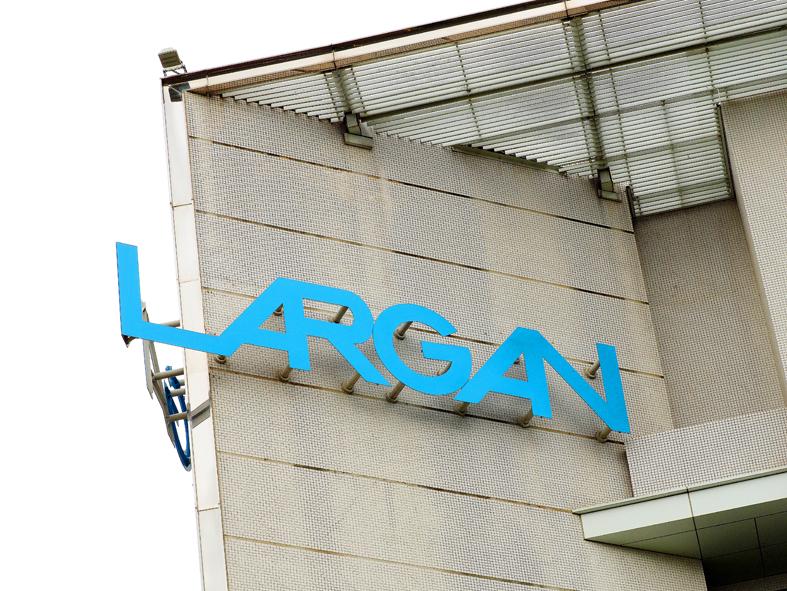Smartphone camera lens maker Largan Precision Co (大立光) yesterday posted its highest net profit since the fourth quarter of 2020, attributing the figure to nonoperating gains, but gross margin continued to slide, falling to the lowest in eight years.
The Taichung-based firm made a net profit of NT$5.51 billion (US$190 million) in the first quarter of this year, up 7.34 percent from a quarter earlier. On a year-on-year basis, profit was up 3.71 percent.
Nonoperating gains contributed NT$2.75 billion, including foreign exchange gains of NT$2.38 billion, Largan said.

Photo: David Chang, EPA-EFE
Earnings per share were NT$41.3, compared with NT$38.37 in the previous quarter, marking the highest in the past five quarters.
However, gross margin fell to 53.36 percent from 55.85 percent in the fourth quarter of last year, compared with 64.77 percent a year earlier.
Last quarter’s gross margin was the lowest since the fourth quarter of 2014, when it was 50.61 percent, company data showed.
Revenue declined to NT$10.13 billion in the first quarter due to a seasonal slowdown, down 22 percent quarterly and 14 percent annually, the company said.
Largan chief executive officer Adam Lin (林恩平) told an online conference that seasonal factors continued to weigh on the company’s business, and revenue for this month and next month would not be higher than last month’s.
Affected by lockdowns in cities in China posting surging COVID-19 case numbers and tight supply for some components, bottlenecks persist in the company’s supply chain, Lin said.
This quarter, Largan’s capacity utilization and product mix would be similar to last quarter, he said, adding that shipments are expected to peak in the second half of the year.
The company — whose customers include Apple Inc, Sony Corp, Samsung Electronics Inc and Huawei Technologies Co (華為) — would continue to focus on high-end lenses for premium smartphones this year, instead of mid-range and low-end lenses increasingly favored by many handset vendors, he said.
Despite slowing specification upgrades in smartphones in the past few months, Lin said that the number of models featuring 8P lens modules is increasing.
An 8P lens contains eight thin layers and is more advanced than lenses with fewer layers.
However, demand for 8P lenses would mainly depend on clients’ production schedules and market conditions, he said.
As for other products, Lin said the company plans to start shipping some lenses for virtual reality devices by the end of this year at an initially small volume, while it would continue to expand its business of automotive lenses.
Largan is constructing new manufacturing facilities in Taichung, with one new plant to be launched in the second quarter of next year, Lin said.
The new plant would start to make revenue contribution as early as in the second half of that year, he said.

SEMICONDUCTORS: The firm has already completed one fab, which is to begin mass producing 2-nanomater chips next year, while two others are under construction Taiwan Semiconductor Manufacturing Co (TSMC, 台積電), the world’s largest contract chipmaker, plans to begin construction of its fourth and fifth wafer fabs in Kaohsiung next year, targeting the development of high-end processes. The two facilities — P4 and P5 — are part of TSMC’s production expansion program, which aims to build five fabs in Kaohsiung. TSMC facility division vice president Arthur Chuang (莊子壽) on Thursday said that the five facilities are expected to create 8,000 jobs. To respond to the fast-changing global semiconductor industry and escalating international competition, TSMC said it has to keep growing by expanding its production footprints. The P4 and P5

DOWNFALL: The Singapore-based oil magnate Lim Oon Kuin was accused of hiding US$800 million in losses and leaving 20 banks with substantial liabilities Former tycoon Lim Oon Kuin (林恩強) has been declared bankrupt in Singapore, following the collapse of his oil trading empire. The name of the founder of Hin Leong Trading Pte Ltd (興隆貿易) and his children Lim Huey Ching (林慧清) and Lim Chee Meng (林志朋) were listed as having been issued a bankruptcy order on Dec. 19, the government gazette showed. The younger Lims were directors at the company. Leow Quek Shiong and Seah Roh Lin of BDO Advisory Pte Ltd are the trustees, according to the gazette. At its peak, Hin Leong traded a range of oil products, made lubricants and operated loading

The growing popularity of Chinese sport utility vehicles and pickup trucks has shaken up Mexico’s luxury car market, hitting sales of traditionally dominant brands such as Mercedes-Benz and BMW. Mexicans are increasingly switching from traditionally dominant sedans to Chinese vehicles due to a combination of comfort, technology and price, industry experts say. It is no small feat in a country home to factories of foreign brands such as Audi and BMW, and where until a few years ago imported Chinese cars were stigmatized, as in other parts of the world. The high-end segment of the market registered a sales drop

Citigroup Inc and Bank of America Corp said they are leaving a global climate-banking group, becoming the latest Wall Street lenders to exit the coalition in the past month. In a statement, Citigroup said while it remains committed to achieving net zero emissions, it is exiting the Net-Zero Banking Alliance (NZBA). Bank of America said separately on Tuesday that it is also leaving NZBA, adding that it would continue to work with clients on reducing greenhouse gas emissions. The banks’ departure from NZBA follows Goldman Sachs Group Inc and Wells Fargo & Co. The largest US financial institutions are under increasing pressure